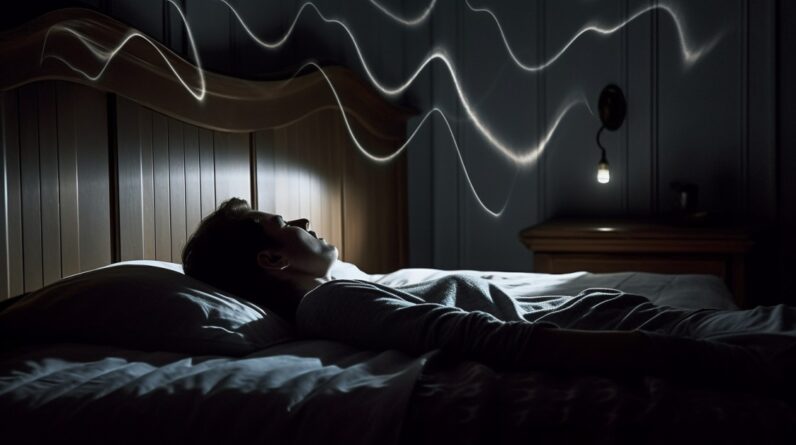
We may earn money or products from the companies mentioned in this post.
As an Amazon Associate I earn from qualifying purchases.
Table Of Contents
Introduction
Have you ever had a quiet moment, only to be confronted with a pulsating buzz, a continual high-pitched whistle, or a series of clicks that seem to originate from nowhere other than your ears? You’re not alone. Millions around the world are grappling with these uninvited guests, a symptom of a condition known as tinnitus. The booming question for many though is – why does tinnitus amplify itself at night?
Understanding Tinnitus
Tinnitus refers to the perception of noise or ringing in the ears. It’s not a disorder in itself but rather a symptom of an underlying condition, such as age-related hearing loss, circulatory system disorder, or ear injury. Tinnitus can significantly impact the quality of life, leading to sleep disturbances, difficulties with concentration, and emotional stress.
There are two main types of tinnitus- subjective tinnitus, the most common type, where only the sufferer can hear the noise and objective tinnitus where the doctor can also hear the noise during examination.
Tinnitus can be caused by many things, from exposure to loud noises, such as music concerts or industrial work sounds, to head/neck injuries and diseases like diabetes or thyroid.
But here’s the thing—Tinnitus is not a ‘one-size-fits-all’ symptom. Its onset, pattern, and impact can vary dramatically among individuals. For a more comprehensive look at what causes tinnitus, you may find this article helpful.
What is Nighttime Tinnitus?
As the name suggests, nighttime tinnitus refers to the heightened perception or worsening of these sounds at night. Typically, the silence of the night makes these sounds more noticeable, often leading to difficulty sleeping and heightened distress. Further, factors such as anxiety and a lack of distractions can also contribute to amplified tinnitus sounds at night.
Tinnitus Sounds at Night
The sounds experienced by people with tinnitus can vary widely. Some describe it as buzzing, humming, chirping, cricket-like sounds, white noise, or even music, while others report hearing a constant ringing.
Varieties in tinnitus sounds often correlate with the root cause. For instance, hearing loss-induced tinnitus often results in a buzzing or ringing sound. Pulsatile tinnitus, commonly associated with head or neck tumors, can cause sufferers to hear a rhythmic thumping or whooshing sound resembling a heartbeat. If you want a deep dive into understanding what tinnitus sounds like, check out this comprehensive blog post.
Why Does My Tinnitus Get Louder at Night?
A big contributing factor to louder tinnitus at night is the contrast between the buzzing or ringing sounds and the quiet environment of nighttime. In the daytime, ambient sounds can partially or fully mask tinnitus sounds. However, at night in the silence of your room, tinnitus sounds can seem louder and more intrusive.
There’s also a remarkable link between anxiety and tinnitus. As the stress of the day winds down and the distraction of daytime activities subsides, nighttime can bring about a heightened sense of awareness of one’s tinnitus. This heightened anxiety leads to a vicious cycle, where anxiety amplifies the perception of tinnitus, which in turn increases anxiety more.
You don’t have to navigate this alone; check out our blog post on treating tinnitus-induced anxiety for guidance and support.
Is It Normal To Experience Tinnitus at Night?
While tinnitus at night can be uncomfortable, it’s often more common than most people realize. As we’ve discussed, the quietness of the night amplifies our brain’s focus on sounds like the ringing or buzzing associated with tinnitus. This can make it seem like the tinnitus is louder or more noticeable at night, although it hasn’t necessarily worsened.
However, it’s worth noting that persistent or disruptive tinnitus, especially when experienced predominantly at night, should not be ignored. Remember, tinnitus itself is a symptom, not a disease. Prolonged instances of tinnitus can indicate other underlying medical issues – like blood pressure irregularities, problems with the jaw joints (TMJ issues), stress, depression, or even certain medications. For a deeper understanding of the different causes of tinnitus, head over to our blog post on dizziness and tinnitus causes.
Tinnitus in One Ear Only at Night
Dealing with that incessant ringing or buzzing in just one ear? This is known as unilateral tinnitus and it’s as baffling as it is aggravating. Typically, when tinnitus is only present in one ear, it may be a symptom of a more localized issue, such as a blockage in the ear, damage to hearing nerves, or blood vessel disorders.
How it influences sleep can vary dramatically among individuals. For some, sleep may be scarcely affected. However, for others, a piercing sound in one ear can cause considerable sleep disturbances leading to daytime fatigue and stress. Seeking medical help is advised if tinnitus in one ear is affecting your sleep or daily life.
As for handling unilateral tinnitus, treatments can range from simple home remedies like white noise machines Check out our top recommendations, to more elaborate solutions involving Cognitive Behavioral Therapy (CBT) or Tinnitus Retraining Therapy (TRT).
What works best truly depends on the underlying cause, individual resilience, and the severity of symptoms. Also, don’t forget to visit this informative page about ear ringing suddenly to arm yourself with even more knowledge!
Coping With Loud Tinnitus at Night
Getting through the night with loud tinnitus can be daunting and exhausting. But it certainly isn’t a lost cause. Here are a few strategies that can help you cope and get a good night’s sleep.
1. Stress and Anxiety Management: As we discussed earlier, stress and anxiety can catalyze the perception of tinnitus. Techniques that reduce stress, like mindfulness and relaxation exercises, can prove beneficial. Regular physical activity and a balanced diet also contribute to reduced stress levels. For some valuable advice about managing stress-induced tinnitus, you might find this in-depth blog post helpful.
2. Lifestyle Changes: Modifying daily habits and lifestyle can significantly minimize tinnitus symptoms. Limit exposure to loud noise, cut down on caffeine and alcohol, maintain a consistent sleep schedule, and create a calm sleeping environment. In some cases, even a specific diet can help mitigate tinnitus symptoms.
3. Sound Therapy and Cognitive Behavioral Therapy: Sound therapy involves the use of external noise to alter a patient’s perception of, or reaction to, tinnitus. These sound generators, or white noise machines, can make tinnitus less noticeable. Our detailed blog post on the best white noise machines available could give you a great head start.
The Role of Cognitive Behavioral Therapy in Managing Tinnitus
CBT is a type of talk therapy that teaches patients to react differently to the stress and anxiety associated with tinnitus. Instead of eliminating the sound, CBT helps you understand and manage your reaction to it, effectively reducing its impact. CBT can also help alleviate insomnia in tinnitus patients. If you’re interested in more about how CBT can help manage tinnitus, check out this comprehensive blog post.
Conclusion
If you take anything from this article, let it be this: Yes, tinnitus can be challenging, especially at night, but you’re not alone in this journey. From lifestyle modifications to therapies, there are multiple ways to ease the discomfort. The most crucial point is to seek medical advice whenever tinnitus starts affecting your daily life or causes anxiety.
Remember, everyone’s experience with tinnitus can be different. Being patient and finding what works best for you is key. Tinnitus isn’t a life sentence, just a detour, one that we’re more equipped to handle than we give ourselves credit for.
For more information, support, and awesome resources, don’t hesitate to explore additional blog posts on my website.
Why Do I Have Tinnitus At Night - Frequently Asked Questions (FAQ)
Tinnitus can become more noticeable at night because your sleep environment is quieter. This silence can make the tinnitus sounds seem louder and more intrusive. Also, stress or anxiety that accumulates throughout the day can heighten your awareness of tinnitus at night.
Yes, for some people, the distraction from tinnitus noises can make it difficult to fall asleep, leading to insomnia or other sleep disturbances. Managing these noises through techniques like white noise machines or cognitive behavioral therapy can help alleviate this issue.
Tinnitus can occur in either one ear or both. Unilateral tinnitus (tinnitus in one ear only) can be more noticeable at night particularly while you are trying to sleep. If tinnitus persists in one ear, it is recommended to seek medical advice as it could indicate an underlying medical condition.
Yes, stress and anxiety can exacerbate tinnitus symptoms. These emotions can trigger a cycle where anxiety amplifies the perception of tinnitus, which in turn increases anxiety. Techniques that reduce stress, like mindfulness and relaxation exercises, can often help manage these symptoms.
Indeed, lifestyle modifications can greatly help in managing tinnitus symptoms. These can include avoiding exposure to loud noise, reducing intake of stimulants like caffeine and alcohol, maintaining a consistent sleep schedule, and creating calm and comfortable environments for sleep.
Amazon and the Amazon logo are trademarks of Amazon.com, Inc, or its affiliates.
Related posts:
- Unlocking the Secrets of Ear Pain and Ringing: Comprehensive Guide to Causes, Symptoms, and Breakthrough Relief Strategies
- Tinnitus Unmasked: Why Your Ear Has Been Ringing for Hours and How to Silence It
- Ear Ringing and Ear Pain: Your Ultimate Guide to Diagnosis and Treatment
- Beyond the Ringing: The Unexpected Connection Between OCD and Tinnitus








